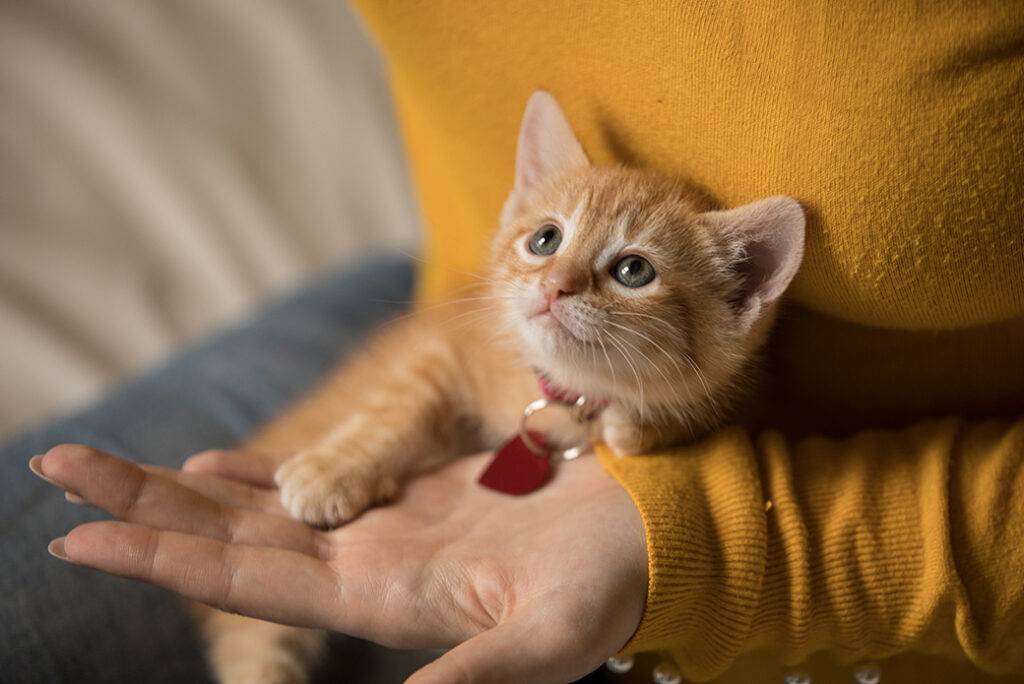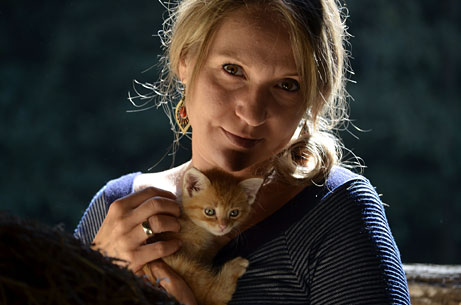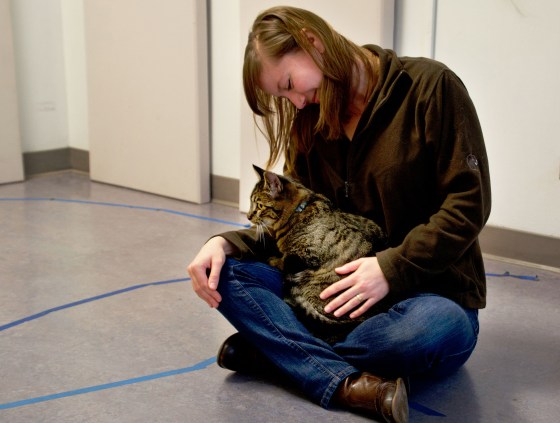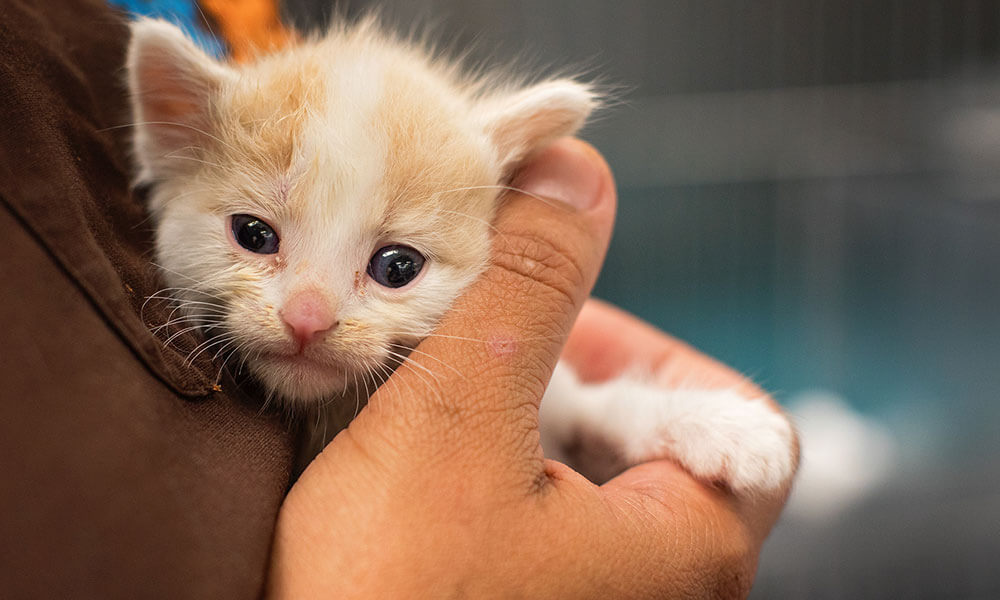If Petpedia stats are anything to go by, 42.7 of million American households owned at least one cat in 2020.
Approximately 1.6 million cats are adopted by cat lovers every year. The United States loves their feline friends so deeply.
Compared to adult cats, kittens are fast-moving. Many people prefer them to adult kitties for all the right reasons.
Having a kitten is like being handed a newborn. You get a blank check from where you can build on.
As an innocent little thing, you can grow and bond with your kitten to your heart’s content.
You have the freedom of exposing her to different situations, environments, and people.
You can teach her tricks, train her to follow a few commands, feed her certain foods, the list goes on.
The number concern of any cat owner—long before having a kitten—is how long it takes to develop a close bond with them.
Nothing breaks your heart than doing all you can to get your kitten to like you only for them to go the opposite direction.
You often wonder what pushes the kitty to ignore or withdraw from you.
How Long Does It Take For A Kitten To Get Used To You?

There are some questions that don’t have one answer. This is one of them.
There are many variables that determine how long it takes for your adorable fluff to warm up and get used to your company.
Some people reach there in a matter of hours. Soon after being introduced to their little friends, they will take no time to cuddle up together. Some cats never leave their owners’ palms right from the word go.
On the other hand, the process can take weeks or months. You can buy a wide range of toys, play games with your pet, move her bowl near you to get him to warm up to you, and exercise patience but still get disappointing results.
It really just depends on some factors that we will go over below.
Factors Affecting the Bonding Time between a Kitten and Their Owner

1. Personality of the kitten
Like human beings, cats have different personalities. Some are outgoing while others are a bit laid-back and shy.
This is the same with kittens. Even in the same litter, you will always observe different personalities within days (if not hours) after birth.
There are those that make friends fast and those that would rather be left alone for a while.
If you end up with a friendly and outgoing kitten, creating a bond with them shouldn’t take a lot of time.
In a matter of days, they will be hanging around you, accepting food from your hands, cuddling with you, and rubbing their body against your feet.
However, if you get an introverted calm fluff, you will need to give them time to be comfortable around you.
Luckily, this type may take time to get used to their owners but once they do, there’s no separating them.
2. Personality of the owner
Secondly, your own personality also goes a long way in determining whether you will bond with your kitten fast or slowly.
See, people who have an easy time creating new relationships do what it takes to get there.
They call their prospects, make time to visit them, and generally keep in touch with them.
Naturally, they have a higher chance of success than those that leave everything to chance.
A cat owner that spends time with their kitty—playing with them, just sitting by them, giving them treats, and talking to them has higher odds of success.
On the other hand, the one that just sits and hopes the cat gets used to them may not get desired results as quickly as they would love to.
3. Age
The age of your bundle of joy is directly linked to how fast (or slow) she will adjust to her new home.
The younger the kitten, the faster she will get used to you.
Of course, young means 8 weeks old – nothing less than that.
At that age, she will only have to deal with the new home.
Older kittens, on the other hand, will have gotten used to a specific territory. Forgetting their older homes and adjusting to the new one can prove difficult.
Don’t be surprised if an older kitty ignores you longer than you had anticipated.
As long as you keep offering food, water, love, and kindness, she will turn around.
4. The Kitten’s Past
Here’s another huge factor that affects the length of time a kitten will take to get used to you.
If you know a thing or two about cats, you are probably aware that they never forget bad experiences.
A good example is abuse. A cat that is mistreated at a certain point in their lives will always remember it. She will associate certain triggers with that dark past.
If your kitten used to be hit by her owners, thrown around, yelled at, or left alone for long periods of time, she will tend to be shy around people.
The same goes for one that wasn’t exposed to humans early enough. They will need more time to warm up to the sweetest of souls.
Here, you will need to be patient with your furbaby and let her be assured of your love for her. Over time, she will know that she’s safe around you.
5. Environment
A change in environment will also impact the length of bonding with a new kitten.
For example, if you picked the kitchen in a farmhouse and placed her in an apartment, she will need time to acclimatize.
Perhaps she had access to the outdoors in her old home.
Failure to have such in the new can mess with her emotional health.
Things like new amenities, noise (or lack thereof) are also disruptive for a cat.
5. Socialization of the kitten
A kitten that was born around people behaves differently from one that doesn’t get a glimpse of humans for a long time.
The latter gets to understand that although they are created differently, human beings are not the enemy.
Hence, once they are adopted into a new home, they will take a relatively short time to bond with the owners.
However, a kitten that was birthed away from people and who doesn’t interact with them much has a harder time warming up to them.
You have to work twice or thrice as hard to make them feel comfy around you. Again, patience and kindness will win them over quickly.
6. Presence of other pets
If you have another cat or dog, your new friend may need more time to feel comfortable around the home. That will affect her getting used to you.
It takes some time to gain enough trust from the animals and people around her.
Oppositely, having other pets can also work to your advantage if they don’t terrorize the kitten.
She may actually like their company and ultimately get used to the humans as well.
7. Breed
Lastly, the breed of cat also plays out when it comes to bonding.
Although this is more of a generalization, it has been shown that some feline friends are friendlier than others.
Top on the list according to Purina is the Abyssinian. This one enjoys life and is always looking to be affectionate with you.
Others include the Persian, Ragdoll, Burmese, Chartreux, Maine Coon, and Exotic Shorthair.
If you have the not-so-friendly breed of kitten, give her more time to get used to your company.
Related Post: 12 Least Affectionate Cat Breeds
What Can You Do?

Every pet owner wants to fast-track the bonding process with their kittens.
Well, there are things you can do to ensure this.
- Don’t shout at the cat: shouting will only scare the animals and ruin her chances of warming up to you.
- Be loving: make an effort to speak to the kitten in a soft voice, praise her, call her to play (even if she doesn’t come), and offer treats.
- Use feeding to your advantage: place the food bowl near you and move it closer with each day. Try to be present when the kitty is feeding. Place yummy treats on your hand and offer them to the cat. Once she’s comfortable, touch her coat and see her reaction.
- Patience, patience, patience: it may take a year for you and the kitten to bond well. Practice patience.
Closing Thoughts
If wishes were horses, cat owners would trick their cats into getting used to them as soon as they come home.
However, the reality is different. The bonding process can be fast or slow depending on many factors mentioned here. It can take anywhere from hours to months.
To speed up the process, show the little one affection and spend time with them. Soon, they will warm up to you.
Related Post: Will Two Kittens Bond With Me?

Hi! I am Eleanor Price. I started this website after my cat, Louie, almost died from a case of botulism (a type of food poisoning often caused by bacteria that grow on food items). Turned out that my cat’s diet was the problem. I have made it my duty to provide the best information and recommendations about everything cat lovers need to know about their felines’ health and wellbeing. My goal is to find the most informative content on anything feline-related and share it with fellow hardworking kitty lovers.

